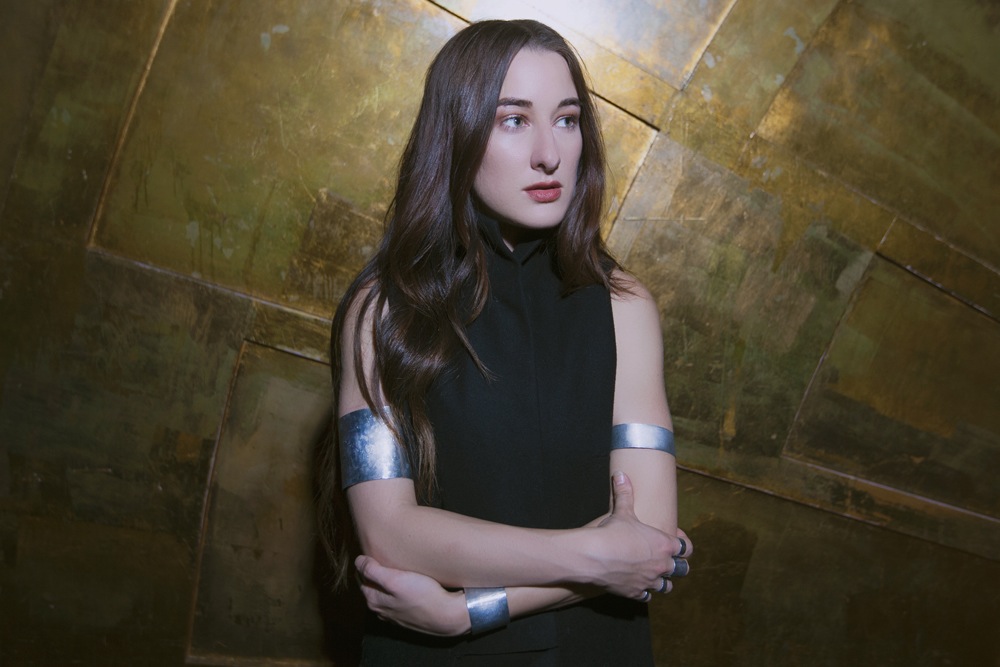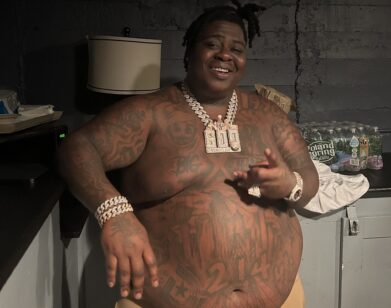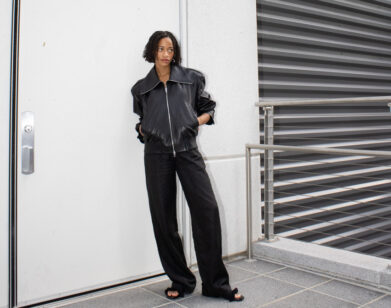In the Zone with Zola Jesus

ABOVE: ZOLA JESUS
The forest is an interesting storytelling trope: it can be enchanted and full of childlike majesty, or synonymous with with doom, darkness, and death. It is this fine line that Zola Jesus, the solo project of Seattle-based Nika Danilova, balances with her fifth album, Taiga. Released October 7 via Mute Records (the Brits behind Depeche Mode and Erasure), Taiga maintains the electro-brooding and gothic aesthetics for which Danilova is known, but not at the expense of her pop sensibilities.
Certainly Danilova’s most “pop” outing to date, Taiga explores nothing less than human nature, existence, and sanity through the course of its 11 tracks. The 25-year-old croons of a certain idealized responsibility that people have to themselves, to each other, and to the world around them. In short, it’s pop music with a message. Match that to Danilova’s grandly orchestrated production of brass, strings, and sonic synthetics, and the resultant Zen is something rarely seen in the realm of Top 40.
This oneness is further explored in Danilova’s live show. Heralded by a symphony of smoke, lights, and mirrors, the singer is joined onstage for Taiga‘s tour by her core band and a brass ensemble while donning her trademark sci-fi-meets-tribal attire. Also with her is husband. “What we do as musicians is so unstable, and it just gives you this anchor and makes you feel like your home is always with you,” Danilova says of his presence on the road.
In conjunction with her October 19 show at Webster Hall—a homecoming of sorts, as New York was one of the first places Danilova ever played—we chatted with the singer-songwriter about exploring her newfound affinity for pop, finding empowerment in isolation, and imparting the Zen she’s constantly in search of herself.
BENJAMIN LINDSAY: Your tour just kicked off October 8 in San Francisco. How have the shows been going so far?
NIKA DANILOVA: Really, really well. They’ve been amazing.
LINDSAY: Have you found Taiga and its shift in sound has changed the vibe of your live shows?
DANILOVA: I can’t really explain how, [but] there’s a difference—there’s an ease that’s very new.
LINDSAY: Is that just on account of the crowd Taiga is attracting, or is it the same people you’ve always seen?
DANILOVA: It’s definitely the same people who have been with me since the beginning, which is really cool. I’ve only done two shows so far, but I just feel very comfortable with what’s going on onstage; I feel really comfortable with the songs. I can’t really explain it, but it definitely feels different than the older material.
LINDSAY: You’ve said in previous interviews that for the longest time, you were kind of ashamed of making pop music and that shame would lead to the various distortions and synthetics that layer on top of it. Why did you finally decide to embrace pop with?
DANILOVA: I think everything about what I do inhabits this duality. There’s going to be the darkness and there’s going to be the lightness. I feel like some records I’ve gone darker, and some records I’ve gone lighter, but both sides are always going to be there. With this record, it’s exploring a different side of that—who I am and how I can express the different things that I believe in.
LINDSAY: So this isn’t necessarily a permanent shift in direction, then.
DANILOVA: I can’t say what I’m going to make for the next record or the record after that, but I’m never comfortable being in the same place for very long.
LINDSAY: Has “Dangerous Days” become a crowd favorite yet?
DANILOVA: Yeah, the first show that I played in San Francisco, the room just felt very celebratory, I think because I’ve been gone for so long. “Dangerous Days” was one of the first songs I played in the set, and people were excited, and the room did not feel stiff, which sometimes—maybe because I’m not usually comfortable onstage—I can feel very stiff. There was definitely a sense of excitement when that song came on.
LINDSAY: What’s the message behind that first single?
DANILOVA: It’s about feeling like you never really know what the truth is—you never really know what’s going on in the world. There’s so much on the news, we hear so much on social media and so many different, conflicting things. It’s more of an issue than ever with the current events happening, especially in the U.S. right now. It’s still important to remain cynical and always be asking yourself, “Is this the truth, or could there be other layers of what we’re not seeing or hearing?”
LINDSAY: Something you tweeted recently, which I actually thought was brilliant, was: “Artists are masochists and critics are sadists.” In that sense, critics are part of this media, and I’m curious if that notion at all relates to “Dangerous Days”—that you can’t really listen to the people who are putting forth the news and telling you what to think.
DANILOVA: I think everyone should be telling themselves that, whether they’re an artist, a journalist, or anything. You should always be questioning what’s true to you and what you believe in.
LINDSAY: Do you take to heart what your critics have to say?
DANILOVA: No, I don’t. I know that I gave everything I could, at least for the most immediate example: this record. I know that I gave absolutely everything I could possibly give in the world, and I believe in this record so much and I’m so extremely proud of it, that if anybody is critical of it, it just confuses me because I feel like they don’t see what I see. But that does not waver my opinion of what I put out into the world.
LINDSAY: When are you happiest as a musician? You have reclusive tendencies in your songwriting, and now you’re touring it around. Do you prefer that intrapersonal relationship between you and your music, or do you like getting up on stage and touting it around the country?
DANILOVA: It depends. Usually whatever I’m doing at that moment, I like to do the opposite thing. But I’ve actually really come to like playing live because you’re on the ground and you’re having to convince people in the flesh and you’re trying to communicate this music and the creative ambition of what you’re doing to the people who could potentially get the most out of it. Artists, yeah, they’re masochistic, but it’s about having a conversation, and it’s exciting to be able to do that every night with new people and to have that connection with people. It’s actually pretty special.
LINDSAY: Masochism has a negative connotation to it, but you have to be vulnerable and put yourself out there and put your work out there to create that intimacy onstage.
DANILOVA: Ninety-percent of the things I do in my life are filled with fear and anxiety, and I go, “Why I am doing this?” But then you get through it and you’re like, “Oh, that’s why I did it—because I didn’t think I could do that.” And that’s masochism!
LINDSAY: What was the writing of Taiga like? I know you were on an island off the coast of Washington.
DANILOVA: The writing experience was very long. I like to say there’s no progression without destruction, so it took a lot of destroying everything that I thought I knew about music, everything I thought I knew about myself as a musician and myself as a person, and then rebuilding and figuring out what I need to sayto the world right now—what feels right. It eventually came out.
LINDSAY: Do you feel like you needed that seclusion to hone that part of yourself?
DANILOVA: Definitely. The thing that’s also important about being isolated in a natural world is that you do feel so insignificant, but at the same time, you don’t feel thwarted by that; I feel quite empowered by the opportunity to be one of these small, little things and trying to do something passionate and honest. When you’re in a sea of people, you feel thwarted by society. “Oh, there are people here that can handle that, that can take that challenge. I don’t need to do it.” But when you’re in that big open expanse, it feels like it’s all on your shoulders and that you’ve got to do it and that you can do it.
LINDSAY: With the pressure of putting out this album and touring, how do you keep your Zen mentality?
DANILOVA: It’s incredibly, incredibly difficult. And, in fact, I usually fail. It’s a battle with yourself everyday to just maintain perspective about feeling like anything matters because in a sense, it really doesn’t. We don’t know why we’re here or why we even have to contribute anything, and yet we still do it and we still try. I think that’s what keeps you going—the fact that you don’t know what’s going on, you don’t know why you’re here, so you might as well give it everything you’ve got just in case. I guess that’s the only thing that keeps me motivated and determined. It’s either this, or I just become one with the dirt.
TAIGA IS OUT NOW VIA MUTE RECORDS. SEE ZOLA JESUS LIVE SUNDAY, OCT. 19 AT WEBSTER HALL. FOR MORE INFORMATION ON THE ARTIST, VISIT HER WEBSITE.






